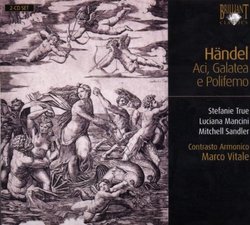| All Artists: George Frederick Handel, Marco Vitale, Luciana Mancini, Contrasto Armonico, Stefanie True Title: Händel: Aci, Galatea e Polifemo Members Wishing: 0 Total Copies: 0 Label: Brilliant Classics Original Release Date: 1/1/2008 Re-Release Date: 3/25/2008 Album Type: Import Genre: Classical Styles: Opera & Classical Vocal, Historical Periods, Baroque (c.1600-1750) Number of Discs: 2 SwapaCD Credits: 2 |
Search - George Frederick Handel, Marco Vitale, Luciana Mancini :: Händel: Aci, Galatea e Polifemo
 | George Frederick Handel, Marco Vitale, Luciana Mancini Händel: Aci, Galatea e Polifemo Genre: Classical
|
Larger Image |
CD Details |
CD ReviewsGigantic Trouble in Arcadia Fires Handel's Imagination Giordano Bruno | Wherever I am, I am. | 12/23/2008 (5 out of 5 stars) "The shepherd Aci is in love with the sea nymph Galatea, but so is the cyclops Polifemo, the same cruel monster later to be blinded by Ulysses. Galatea flees from Polifemo into the depths of the sea. Polifemo seeks revenge by crushing Aci with a boulder. The 'Gods' feel pity for the lovers and change Aci's blood into a limpid stream that flows eternally into the sea's embrace. Such is the story, taken from Ovid, told by Handel's 'serenata' Aci, Galatea e Polifemo, commissioned for a wedding performance in Naples in 1708 and performed several times more in Italy before Handel's departure for Germany and England. This is an entirely different composition from the cantata "Acis and Galatea" that Handel composed later in England, with an English libretto. The Italian work is bolder in conception and far more virtuosic than its English pastoral counterpart.
The 'serenata' was a genre half way from cantata to opera, usually sung at outdoor entertainments of the composer's wealthy patrons, possibly in costume but not staged with scenery. Aci, Galatea e Polifemo has all the drama of any baroque opera, with more variety of affect from aria to aria than most. It features three of Handel's finest arias ever, one by each of the cast; Galatea sings "Benche tuoni..." in the first act, Polifemo sings "Fra 'ombre e gl'orrori..." at the beginning of the second act, followed immediately by Aci's "Qui l'augel ..." with its delicate bird sounds. The orchestra includes the usual strings plus the unusual violone which accompanies Polifemo, as well as oboe, recorders and trumpets -- quite a festive and expressive ensemble! If some of the arias seem familiar, there's the typical explanation; Handel liked his own work well enough to recycle much of it in later operas. On the whole, this is one of Handel's showiest operatic works, making huge demands of virtuosity on the three singers. The bass who sings Polifemo needs to cover a compass from D below the bass staff to a' in the treble, with leaps of two and a half octaves in the middle of the usual gyrations of sixteenth notes. Polifemo is in fact the key character; his singing needs to be simultaneously quite musical and yet quite "monstrous". [As a basso myself, though not much of one, I occasionally wonder why we bassi are so often the bad and the ugly in baroque vocal music. I'll have to write to my congressperson about such stereotyping, harumpf!] Basso Mitchell Sandler brings a rich, fibrous timbre and plenty of bravado to the role of Polifemo, a perfect contrast to the sweet and agile voices of soprano Stefanie True (Aci) and alto Luciana Mancini (Galatea). Notice the oddity that the male role of Aci has the higher tessitura. All three sing with remarkably precise tuning, which pays off in the several duet passage between the women singers and in the trios that conclude each act. Oboist Diego Nadra deserves special recognition for his sprightly obbligato playing, and conductor Marco Vitale scores my highest praise for his attention to musical detail and his ability to lead his orchestra through such varied passages with a sense of overall unity. There are several recordings of this serenata available, including a fairly recent release from conductor Emmanuelle Haim. That performance is slightly marred by the excessive vibrato that Haim seems to require of her singers, and by a weak performance of Galatea by alto Sara Mingardo. Head to head, I prefer this performance by Vitale and his Contrasto Armonico ensemble particularly because of the fine alto singing by Chilean Luciana Mancini. I'll be listening for more of her work, as well as more of Sandler's and True's. There are two listing for this CD on amazon. Who knows why! Be advised that the prices are different; this is the more expensive." |

 Track Listings (20) - Disc #1
Track Listings (20) - Disc #1